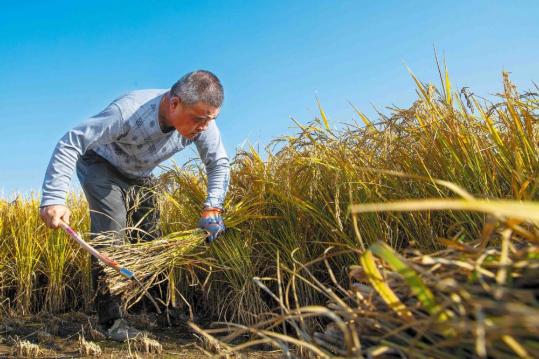Liaoning embracing technology to advance agricultural profits
Northeastern province one of world's three major black soil regions
As locally produced rice varieties reach global tables and hydroponic vegetables redefine urban diets, Northeast China's Liaoning province is reshaping global perceptions of its black soil through multifaceted agricultural upgrades.
As one of the world's three major black soil regions, the three northeastern provinces of Liaoning, Jilin and Heilongjiang produced nearly 15 million metric tons of grain in 2024, according to data from the National Bureau of Statistics.
Although the northeast region boasts fertile land, it has long struggled with the paradox of premium grains failing to command premium prices due to outdated planting methods and rudimentary processing.
Targeting the gap, local pantry staple food company Shiyue Daotian Group has addressed the issue via an integrated industrial chain planning from planting, procurement and storage to processing, logistics and sales.
In product quality, from seed selection to scientific cultivation, its end-to-end quality control system has created a stable and efficient modern agricultural ecosystem.
In terms of logistics, by leveraging Shenyang's logistics hub to coordinate production bases across Northeast China and the Inner Mongolia autonomous region, its nationwide express delivery network — integrated with e-commerce platforms — has spurred synergistic growth across primary, secondary and tertiary industries.
In addition, it has also been promoting sustainable farming practices and creating employment opportunities near grain warehouses, benefiting cooperative farmers by offering dual sources of earnings, both from cultivating their fields and working close to home.
Under this model for increased production and income for farmers, from 2020 to 2024, the group procured more than 14 billion yuan ($1.95 billion) worth of grain from the northeastern region, according to the company's data.
Such a full industrial chain layout has enabled the group to maintain strong resilience amid a volatile market environment and become the first rice enterprise listed on Hong Kong's stock market.
According to its 2024 annual report released in April, the company recorded operating revenue of 5.745 billion yuan during the reporting period, up about 18 percent year-on-year.
"Going forward, we will strengthen our position as a food innovation leader, deepen our multi-channel ecosystem, expand our multi-category product matrix and provide consumers with more healthy, premium and safe food choices to advance agricultural branding," said Zhao Wenjun, founder of the group.
While Shiyue Daotian is actively exploring what's possible in rice cultivation, another Liaoning-based enterprise, Shenyang Qiushi Agricultural Technology Development Co Ltd, is navigating the future of high-tech farming.
Founded in 2005, the company has cultivated a 300 mu (20 hectares) planting base, where it introduced a smart plant factory that enables year-round hydroponic vegetable production.
Inside its high-tech plant factory, precision technologies such as hydroponic cultivation, intelligent temperature control and targeted drip irrigation further enhance agricultural productivity.
A computer system automatically regulates key environmental factors, including temperature, humidity, light, CO2 concentration and nutrient solution levels, to ensure optimal conditions for plant growth.
With fully enclosed facilities and consistent indoor temperatures of 15 C to 20 C, crops can grow through the winter without difficulty. This year-round capability marks a significant step toward sustainable, climate-resilient agriculture.
Qiushi's partnership with China Agricultural University has further bolstered its credentials. Together, they've developed hydroponic leafy greens that are entirely pesticide-free, and substrate-grown wild strawberries known for their natural sweetness and vibrant aroma, showcasing the potential of scientific farming to deliver both safety and flavor.
At a national forum on enhancing agricultural enterprises' role in technological innovation last year, Han Jun, minister of agriculture and rural affairs, emphasized the need to empower companies to become active "evaluators" of agricultural technology.
Han called for reforms to improve the evaluation and approval system for scientific achievements, with a greater focus on practical industrial applications. The goal, he said, is to accelerate the transition from prototype to product, and from product to full-scale industry, effectively bridging the "last mile" from agricultural technology labs to farmers' fields.

